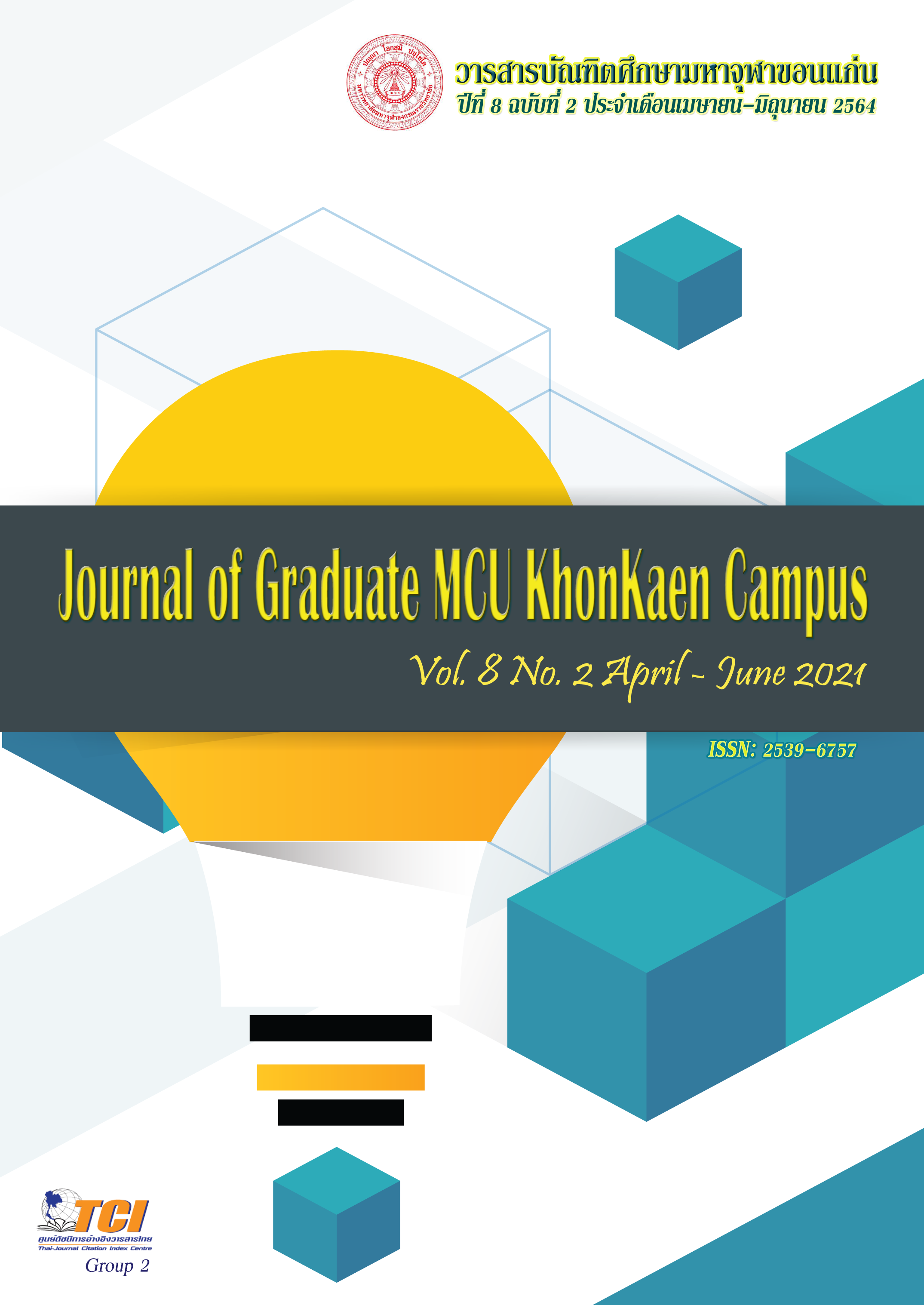FACTORS OF MANAGEMENT AFFECTING ENGLISH ACHIEVEMENT IN THE SMALL-SIZED-SCHOOLS OF THE SECONDARY EDUCATIONAL SERVICE AREA OFFICE 12
Main Article Content
Abstract
The objectives of the research were to 1) study the level of factors of management affecting English achievement, 2) study about factors of management affecting English achievement, and 3) present development guidelines for English achievement. The research design was survey quantitative research. The study samples were 36 small sized-schools of the Secondary Educational Service Area Office 12 in Nakhon Si Thammarat province and 5 key informants. The research equipment were a questionnaire and interview form. The statistical analysis included frequency, percent, mean, standard deviation and English achievement analysis by Multiple Regression Analysis.
The results of the study were as follows: 1) It was found that overall factors of management affecting English achievement was at a high level. The factors, ranked from the highest to the lowest, were school administrators, teachers, students and family. 2) The factors of management affecting English achievement could be applied to predict English achievement by 1.10 percent. Therefore, the factors of management were not affecting English achievement. 3) Guidelines to improve English achievement in the small sized-schools of the Secondary Educational Service Area Office 12 include administrators providing academic leadership by announcing academic goals and team attitude building, as well as deep management. Teachers should vary teaching processes, incorporate appropriate evaluation and interactions with students of different ability. Students will need to create a positive attitude towards English learning and should have basic knowledge. Family should give advice and teach students intimately in the correct way.
Keywords: Factors of Management, English Achievement, Small-Sized-Schools
Article Details
References
จริยาภรณ์ พรหมมิ. (2559). ปัจจัยภาวะผู้นำทางวิชาการของผู้บริหารสถานศึกษาที่ส่งผลต่อประสิทธิผลของโรงเรียนในสังกัดสำนักงานเขตพื้นที่การศึกษาประถมศึกษาสุพรรณบุรี เขต 3. ใน วิทยานิพนธ์การศึกษามหาบัณฑิต สาขาวิชาการบริหารการศึกษา: มหาวิทยาลัยบูรพา.
ชนิดา ยอดสาลี. (2559). ปัจจัยเชิงสาเหตุที่มีอิทธิพลต่อผลสัมฤทธิ์ทางการเรียนของนักเรียนในสถานศึกษาขั้นพื้นฐาน สำนักงานเขตพื้นที่การศึกษาประถมศึกษาประจวบคีรีขันธ์ เขต 2. ใน วิทยานิพนธ์ครุศาสตร์มหาบัณฑิต สาขาวิชาการบริหารการศึกษา: มหาวิทยาลัยราชภัฏเพชรบุรี.
บุศรา เต็มลักษมี. (2558). ปัจจัยที่มีความสัมพันธ์ต่อผลสัมฤทธิ์ทางการเรียนวิชาภาษาอังกฤษของนักเรียนชั้นมัธยมศึกษาตอนต้น จังหวัดประจวบคีรีขันธ์ สังกัดสำนักงานเขตพื้นที่การศึกษามัธยมศึกษา เขต 10. ใน วิทยานิพนธ์การศึกษามหาบัณฑิต สาขาการบริหารการศึกษา: มหาวิทยาลัยบูรพา.
ผกามาศ คงเกื้อ. (2561). ปัจจัยที่ส่งผลต่อผลสัมฤทธิ์ทางการเรียนของนักเรียนชั้นมัธยมศึกษาปีที่ 6 โรงเรียนเตรียมอุดมศึกษาน้อมเกล้า สมุทรปราการ สำนักงานเขตพื้นที่การศึกษามัธยมศึกษา เขต 6. ใน วิทยานิพนธ์การศึกษามหาบัณฑิต สาขาวิชาการบริหารการศึกษา: มหาวิทยาลัยบูรพา.
สำนักงานเขตพื้นที่การศึกษามัธยมศึกษา เขต 12. (2561). ข้อมูลสารสนเทศทางการศึกษา พ.ศ. 2561. สืบค้นเมื่อ 8 สิงหาคม 2562, จาก http://www.infosea12.info/infoonline/images/stories/ studentData/information61.pdf.
สุพิชญ์กฤตา พักโพธิ์เย็น. (2560). การศึกษาปัจจัยที่ส่งผลต่อผลสัมฤทธิ์ทางการศึกษาของนักศึกษาระดับบัณฑิตศึกษา สาขาวิชาหลักสูตรและการสอน มหาวิทยาลัยธุรกิจบัณฑิตย์. ใน วิทยานิพนธ์ศึกษาศาสตรมหาบัณฑิต สาขาวิชาหลักสูตรและการสอน: มหาวิทยาลัยธุรกิจบัณฑิตย์.
Christiana Ogbogu.(2014).Institutional Factors Affecting the Academic Performance of Public Administration Students in a Nigerian University. Public Administration Research, 3(2), 171.
EF English Proficiency Index. (2019). The world's largest ranking of countries and regions by English skills. From https://www.ef.com/ca/epi/#%208/8/2562
Gerald N. Kimani. (2013). Teacher Factors Influencing Students’ Academic Achievement in Secondary Schools in Nyandarua County, Kenya. International Journal of Education and Research, 1(3), 1.
Mansour Garkaz. (2011). Factors Affecting Accounting Students’ Performance: The Case Of Students At The Islamic Azad University. Procedia-Social and Behavioral Sciences, (29), 122.

